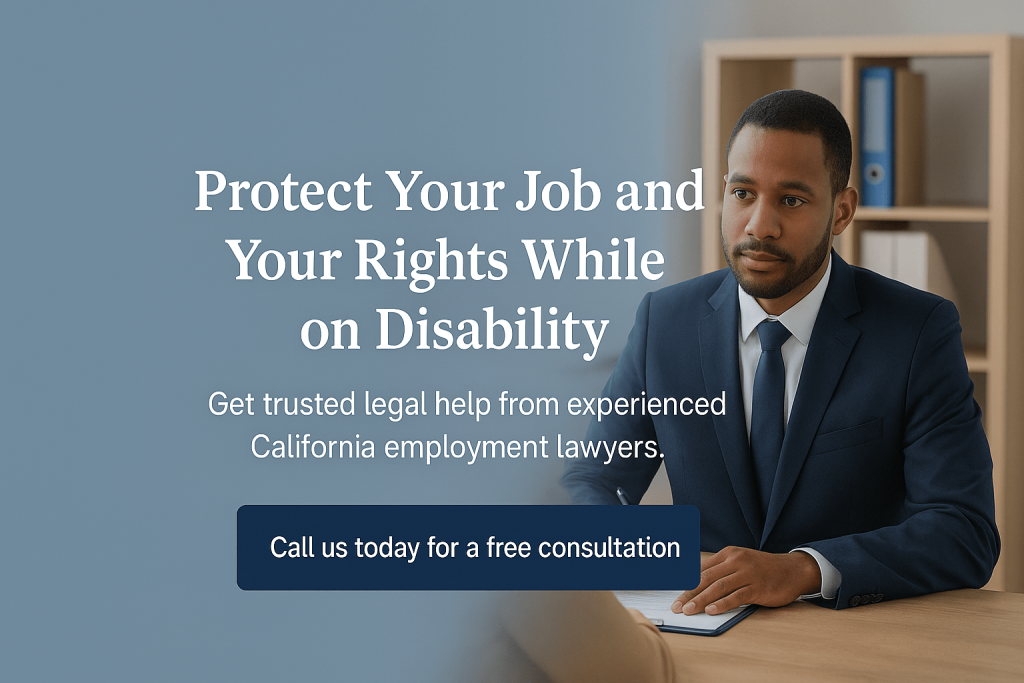Can You Be Fired for Disability Discrimination in California?

Being fired for disability discrimination in California is illegal under the California Fair Employment and Housing Act (FEHA). This law protects employees with a broad range of physical and mental disabilities and prohibits discrimination in hiring, firing, promotions, and other employment decisions. If you were terminated because of your disability, you may have the right to file a claim with the California Civil Rights Department or pursue a private lawsuit to recover damages.
If you believe your rights have been violated, speaking with a California employment lawyer can help you understand your legal options and protect your future. Call (866) 646-6676 today for a free consultation and let an experienced attorney fight for the compensation and justice you deserve.
How long is your job protected while on disability in California?
In California, job protection during disability leave varies based on the type of leave taken. Under the Family and Medical Leave Act (FMLA) and California Family Rights Act (CFRA), eligible employees are granted up to 12 weeks of job-protected leave within 12 months for serious health conditions.
Additional protections may extend beyond this period depending on individual circumstances, reasonable accommodations, and protections under the California Fair Employment and Housing Act (FEHA), ensuring employees have fair opportunities to manage health needs without risking their employment.
If you believe you are the victim of wrongful termination, we have a California wrongful termination lawyer available for a free consultation
Legal Protections for Employees on Disability Leave
California law offers robust protections to employees who need time away from work due to a disability. Below are the key federal and state laws that safeguards employees on disability leave.
These laws can be difficult to understand by yourself, but our expert employment attorneys can offer you tailored guidance on how these apply to your situation:
Family and Medical Leave Act (FMLA)
The Family and Medical Leave Act is a federal law that provides eligible employees up to 12 weeks of unpaid, job-protected leave per year for serious health conditions, including disabilities.
FMLA applies to companies with 50 or more employees and requires that employees worked at least 1,250 hours over the past year.
Under FMLA, employers must reinstate employees to their original or equivalent position after their leave, ensuring that disability leave does not jeopardize their employment.
California Family Rights Act (CFRA)
The California Family Rights Act mirrors FMLA protections but applies to California-specific employers with five or more employees. Like FMLA, CFRA provides up to 12 weeks of job-protected leave per year for serious health conditions, including disabilities.
While FMLA and CFRA often overlap, CFRA can provide additional coverage, such as leave for certain conditions not covered under FMLA. Under CFRA, employees are entitled to return to their same or an equivalent position, reinforcing job security during necessary medical leave.
Americans with Disabilities Act (ADA)
The Americans with Disabilities Act is a federal law requiring employers to provide reasonable accommodations for employees with disabilities, as long as the accommodation doesn’t impose an undue hardship on the business.
While the ADA doesn’t provide direct leave provisions, it supports flexible accommodations, which may include adjusted work schedules or limited job duties upon returning from disability leave.
Employers are prohibited from discriminating against employees because of a disability and must ensure that all employment actions, including termination, are non-discriminatory.
California Fair Employment and Housing Act (FEHA)
The California Fair Employment and Housing Act is a state law that prohibits discrimination, harassment, and retaliation against employees with disabilities.
FEHA requires California employers to provide reasonable accommodations for employees with disabilities, such as modified work duties or extended leave beyond what FMLA and CFRA provide.
If additional time off can be considered a reasonable accommodation, FEHA can offer essential protection, especially if an employee’s disability necessitates extended leave.
Paid Sick Leave Law
Under California’s Paid Sick Leave Law, employees accrue paid sick leave at a minimum rate of one hour for every 30 hours worked, which can be used to manage health conditions, including disabilities.
This law enables employees to take time off for immediate health needs without using unpaid leave options, helping to cover short-term needs or bridge gaps when on longer-term disability leave.
Retaliation Protections
California law prohibits retaliation against employees for taking disability leave or requesting accommodations for their health conditions. Retaliation includes any adverse action that would discourage an employee from asserting their rights, such as:
- Termination
- Demotion
- Reduction in benefits
FEHA and ADA protect against retaliatory actions, allowing employees to seek justice if their rights are violated.
If you’ve been fired while on disability benefits, whether related to a physical or mental condition, contact a Huntington Beach wrongful termination lawyer today today!
Situations Where Termination By Your Employer May Be Legal
While California law provides strong protections for employees on disability leave, there are certain situations where termination may still be legal:
Legitimate Business Reasons
Employers may lawfully terminate employees on disability leave if there is a legitimate business reason unrelated to the employee’s disability or leave. This may include:
- Company-wide layoffs
- Restructuring
- The elimination of a specific position
For example, if a company undergoes a reduction in workforce or ceases a department, employees in those roles could be legally terminated.
In these cases, employers must demonstrate that the decision to terminate was based solely on business needs and not influenced by the employee’s disability status or medical leave.
Performance Issues Unrelated to Disability
An employer may also terminate an employee on disability leave if there are documented performance issues unrelated to the employee’s disability. This includes:
- Poor performance
- Repeated misconduct
- Failure to meet job expectations
To ensure compliance with California law, employers must document instances of poor performance before the employee’s leave.
For instance, if an employee has a documented history of missing deadlines or violating company policies, the employer may have grounds to terminate employment, as long as it’s evident that the decision was not linked to the employee’s disability or use of leave.
Inability to Perform Essential Job Functions
As we’ve mentioned, the FEHA and ADA require employers to explore reasonable accommodations to help employees fulfill their roles.
However, if an employee is unable to meet the core requirements of their position despite accommodations, termination could be legally justified.
For example, if an employee’s role requires specific physical capabilities that they cannot meet due to a disability, and there are no reasonable accommodations to address the limitation, the employer may proceed with termination.
If you’re facing termination or have concerns about your rights, contact Feher Law for guidance. Our experienced team can help you assess your situation and advocate for your legal protection.
When Termination Is and Isn’t Legal During Disability Leave in California
Understanding your rights under leave in California is essential, especially if you’re dealing with disability discrimination in the workplace. While employers can terminate an employee in certain legitimate situations, doing so unlawfully — particularly when it’s tied to a disability or medical leave — can violate state and federal law.
The table below outlines common scenarios where an employer can legally terminate employment and where termination may be unlawful:
| ✅ When Termination May Be Legal | ❌ When Termination May Be Unlawful |
|---|---|
| Company-wide layoffs, restructuring, or elimination of the position unrelated to the employee’s disability. | Terminating an employee because of their disability or medical condition. |
| Documented performance issues or misconduct that existed prior to taking disability leave. | Using disability-related limitations as a reason for termination without exploring reasonable accommodations. |
| Inability to perform essential job functions even after reasonable accommodations have been considered. | Failing to provide or even consider reasonable accommodations before making a termination decision. |
| Termination after the employee has exhausted all legally protected leave and cannot return to work. | Terminating before protected leave ends or without evaluating whether additional leave is a reasonable accommodation under California Fair Employment and Housing Act (FEHA). |
| Legitimate business reasons clearly documented and unrelated to the employee’s disability status. | Retaliating against an employee for requesting or taking disability leave. |
If your termination situation resembles the unlawful scenarios, you may have a legal claim. Don’t face this process alone — a knowledgeable California employment lawyer can help protect your rights and pursue the compensation you deserve.
📞 Call (866) 646-6676 today for a free consultation and let our experienced legal team stand up for you.
Common Unlawful Termination Situations During Disability Leave
Below are some of the most common instances of unlawful termination during disability leave that we see.
- Termination Due to Disability or Health Condition: Employers are required to make reasonable accommodations to support employees with disabilities, and dismissing someone based on their condition is discriminatory. Termination under these circumstances is unlawful and may qualify as wrongful termination.
- Termination for Taking Disability Leave: If an employer terminates an employee for taking this legally protected leave, it is a violation of both state and federal law. Retaliating against employees for utilizing their entitled disability leave is considered an unlawful termination.
- Failure to Provide Reasonable Accommodation Before Termination: If an employer fails to explore and implement reasonable accommodations before considering termination, it may be an unlawful act. For instance, if an employee could perform their essential duties with a minor adjustment to their schedule or job tasks, but the employer dismisses them instead, it could be considered wrongful termination.
- Retaliation for Requesting Disability Leave or Accommodations: This includes actions such as termination, demotion, or any adverse employment action following a request for leave or accommodation.
Steps to Take if You are the Victim of Wrongful Termination or Disability Discrimination
If you believe you’ve been wrongfully terminated or faced discrimination due to your disability, here are the key actions to consider:
- Consult with an Employment Attorney From Our Law Firm: A skilled employment attorney at Feher Law can provide valuable guidance and help determine if you have a strong claim for wrongful termination or disability discrimination. We will assist in gathering evidence, assessing your case, and negotiating with your employer. We can also represent you in court if your case proceeds to litigation.
- Review Your Employment Records and Policies: Start by reviewing your employment records, including your performance reviews, any warnings received, and the company’s disability leave and accommodation policies. An expert from our law firm can help review the relevant paperwork for you.
- Document All Relevant Information: Document any communications with your employer related to your disability, leave requests, accommodations, and performance. Save emails, written warnings, meeting notes, or any other documentation that shows your employer’s responses or decisions regarding your disability.
- File a Complaint with the California Department of Fair Employment and Housing (DFEH): If we believe your termination was unlawful, we can file a complaint with the California Department of Fair Employment and Housing (DFEH). The DFEH investigates claims of discrimination and retaliation, and filing a complaint within one year of the alleged wrongful act is necessary to preserve your right to seek legal remedies.
- Avoid Signing Any Agreements Without Legal Advice: If your employer offers you a severance package or requests that you sign any agreements following your termination, consult with us before signing. Some agreements may waive your right to file a claim or pursue further action. Legal guidance can ensure you don’t unintentionally forfeit any of your rights.
- Take Care of Your Well-being: Experiencing wrongful termination or discrimination can be emotionally challenging. Seek support from trusted friends, family, or a counselor to help manage stress during this time. Taking care of your mental health can make it easier to focus on the steps ahead as you pursue justice.
No matter your medical condition, or physical or mental disability, contact us today for a free consultation if you have been fired while on disability leave
Potential Remedies for Wrongful Termination
Here are potential remedies for wrongful termination that we would look to pursue for the disabled employee:
- Reinstatement of Employment: In some cases, a court may order the employer to reinstate the employee to their former position.
- Back Pay and Lost Wages: Compensation for wages lost from the date of termination until the case is resolved, including any benefits missed.
- Emotional Distress Damages: Compensation for the emotional impact of wrongful termination, especially if the termination involved discrimination or retaliation.
- Punitive Damages: Additional damages intended to punish the employer for particularly egregious or malicious conduct.
- Front Pay: Compensation for future lost wages if reinstatement is not possible or practical.
- Attorney’s Fees and Court Costs: Coverage of legal expenses incurred while pursuing the claim, often awarded if the employee prevails in the case.
- Injunctive Relief: Court orders requiring the employer to implement changes in their policies, practices, or training to prevent future violations.
Each remedy aims to compensate for the impact of wrongful termination, offering the affected employee a path toward justice and recovery.
How Long Do You Have to File a Wrongful Termination Claim in California?
You typically have one year from the date of your termination to file a wrongful termination claim with the California Department of Fair Employment and Housing (DFEH) if the termination involved discrimination, harassment, or retaliation.
However, if the claim relates to a breach of contract or public policy, the statute of limitations may vary, so acting promptly and consulting with our attorneys is essential to protect your rights.
How Much Could Your Disability Discrimination Case Be Worth in California?
If you’ve been wrongfully terminated or mistreated due to a disability, you may be eligible for financial compensation. Settlements in California disability discrimination cases can include lost wages, future earnings, emotional distress damages, and even punitive damages if the employer acted with malice or blatant disregard for your rights.
To help you get a clearer idea of what your case might be worth, we’ve built a disability discrimination settlement calculator just for California employees. It’s easy to use, confidential, and provides a quick estimate based on your situation.
Take the first step—use our disability discrimination settlement calculator now to see how much your case could be worth.
Disclaimer: The results from this calculator are for informational purposes only and do not constitute legal advice. Actual settlement amounts vary based on case details and legal representation.

How Can Our Law Firm Help?
If you’re facing wrongful termination, employment discrimination, or retaliation in California, our experienced attorneys at Feher Law are here to provide the support and legal expertise you need. We understand the serious impact these issues can have on the lives of California workers and are committed to helping you pursue justice and regain stability.
At Feher Law, we specialize in defending employees’ rights, offering comprehensive services tailored to your situation:
- Personalized Case Evaluation: We start with a thorough, free consultation to evaluate your unique circumstances, assess your legal options, and develop a strategy aimed at achieving the best outcome for your case.
- Dedicated Wrongful Termination Support: Our attorneys have extensive experience with California wrongful termination claims, understanding the specific nuances that strengthen your case and the types of compensation you may be entitled to.
- Discrimination and Retaliation Expertise: Whether you’ve experienced workplace discrimination or retaliation, we advocate aggressively on your behalf to hold employers accountable for violations under California’s Fair Employment and Housing Act (FEHA) and other relevant laws.
- Guidance Through the Claims Process: The legal system can be complex, but our team is here to guide you every step of the way. We handle all communications with your employer and prepare all necessary documentation to build a compelling case.
- Commitment to Your Rights: We are dedicated to empowering employees and ensuring their rights are protected. With a client-centered approach, our firm fights to secure fair treatment and just compensation, whether through negotiations or, if needed, in court.
If you’re ready to take action, contact Feher Law today for your free case evaluation. Let us help you protect your rights, pursue the remedies you deserve, and move forward with confidence.
FAQs
Can you get fired while on short-term disability in California?
Yes, but only if the termination is for reasons unrelated to your disability or leave, such as legitimate business needs or documented performance issues. California law prohibits termination solely due to a disability or for taking legally protected leave.
FAQs
Yes, but only if the termination is for reasons unrelated to your disability or leave, such as legitimate business needs or documented performance issues. California law prohibits termination solely due to a disability or for taking legally protected leave. If you believe your termination was unlawful, speaking with a disability discrimination attorney can help you understand your rights and legal options.
If your leave exceeds FMLA or CFRA limits, your employer may lawfully terminate employment if no further reasonable accommodations can be made. However, they must explore all options under California’s Fair Employment and Housing Act (FEHA) before making such a decision.
If your employer refuses reasonable accommodations without valid reasons, it may be a violation of California’s Fair Employment and Housing Act (FEHA). You have the right to request accommodations and, if denied, can file a complaint with the Department of Fair Employment and Housing (DFEH).
Yes, FEHA provides broader protections, requiring California employers to offer reasonable accommodations and protecting against discrimination and retaliation beyond what federal laws like the ADA require. FEHA often applies to smaller employers, covering more workers than federal laws.
Yes, but only if the termination is unrelated to your disability status. Employers must show that dismissal is based on legitimate business reasons or that you can’t perform essential job functions even with reasonable accommodations. FEHA and ADA protections still apply to prevent discrimination.
Yes, you may qualify for unemployment benefits if you’re terminated while on disability, but only if you’re medically cleared to work and meet California Employment Development Department eligibility requirements. Under California employment law, if you’re still unable to work, you may need to rely on disability benefits instead of unemployment.
Yes, but only under certain circumstances. If your short-term disability claim is denied, your employer can take employment action based on legitimate business reasons — not because of your medical condition or disability. California law prohibits termination motivated by disability discrimination or retaliation, even if insurance denies your benefits. If you’re fired after a denial, you should speak with a California disability discrimination lawyer to review your rights.
Yes, you can resign while on disability leave, but it’s important to consider how this might affect your benefits or potential claims. Quitting voluntarily may end your eligibility for disability payments or limit your ability to pursue certain legal claims. Before making any decisions, consult with a California employment lawyer to understand the impact on your rights and benefits.
Related Posts

Pedestrian Injured in Hollywood Car Accident

Colorado QB Dies in Single-Car Accident

Can I Sue a Drunk Driver in California?

Two Killed, Three Injured in Moorpark Head-On Crash







